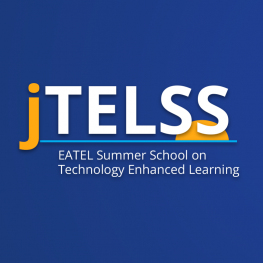Speakers
Daniele Di Mitri
German UDS, GermanyJan Schneider
DIPF, GermanyBibeg Limbu
Leiden Delft Erasmus Center for education and learningRoland Klemke
Open University of The Netherlands, The Netherlands / TH Köln, GermanyStart
05/06/2023 - 14:00
End
05/06/2023 - 15:30
Artificial Intelligence Systems for Feedback Generation
Monday 05/06 14:00-15:30h
Plenary Hall
Abstract
Artificial Intelligence in Education (AIED) has been a research topic for several years, which gained a recent boost due to the availability of applicable AI technology at a large scale. In general, AIED deals with the question of how to use approaches and technologies of AI to better support learners with individual guidance, feedback, and tailored processes. Basic methods represent the student’s knowledge, using techniques such as Constraint-Based Modeling, Knowledge Tracing, Computer-assisted instruction, Intelligent Tutoring Systems, or Automatic Grading Systems. Existing systems mainly focus on content-related subjects such as mathematics, statistics and physics, enhanced with general-purpose tools like chatbots or recommender systems.
In this workshop, we will explore how AIED can be specifically used for feedback generation, helping to develop psychomotor skills, keeping teachers in the loop with the help of large language models, and in a fun way when possible.
Needs Analysis
Artificial Intelligence in Education (AIED) has been a research topic for several years, which gained a recent boost due to the availability of applicable AI technology at a large scale. In general, AIED deals with the question of how to use approaches and technologies of AI to better support learners with individual guidance, feedback, and tailored processes.
Existing systems mainly focus on content-related subjects such as mathematics, statistics and physics, enhanced with general-purpose tools like chatbots or recommender systems. With the advent of sensor-based multi-modal systems as well as augmented and virtual reality, multi-modal learning experiences (MLX) become possible, where AI can also support learning and training about psychomotor skills, student’s attitude, context, or emotion-taking affective and physiological aspects such as stress or concentration levels into account.
Learning Objectives
We propose this workshop to be an introductory workshop of 90 minutes that is accompanied by a mini-track of further in-depth workshops related to AI in education.
- the first part is a lecture-style presentation introducing the rationale of AI in Education for feedback generation.
- the second part is a brainstorming/group-work phase in which groups of participants work on aspects of feedback with AI systems.
Learning objectives:
- Participants learn about various aspects of AI in Education
- The main concepts, historic and future development of AI in education are covered
- The new opportunities introduced by multimodal interfaces, sensors, and advanced machine-learning environments are looked into
Pre-activities
None.
Session Description
A lecture-style presentation about AI systems in Education (15’)
- History of AIED
- The notion of an “Intelligent Tutoring System.”
- Modelling the learner’s
- Knowledge representation and tracing
- Task modelling
- Instructional modelling (planning the feedback)
- Existing and most popular AI systems in Education
Practical AI applications in Education (10’)
- Chatbots and conversational agents
- Recommender systems for study material
- Speech recognition, image classification
- Early warning systems for students at risk
Ongoing research on AI in education (short presentations of PhD projects and upcoming workshops of the AI mini track) (20’)




